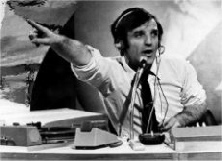
TV Pop Diaries
Pop Music on British Television 1955 -
According to a Radio Times article to promote the first edition of the show Alan
'Fluff' Freeman and his agent proposed the idea for a new type of music show to BBC
commissioners back in Spring 1967. The format would feature live guests, interviews,
reviews and film clips. However, this format looked very similar to the pilot for
the un-
The BBC finally pulled the plug on the too-
After favourable reviews from the BBC viewing panel the show was given the go-
Freeman told Disc a couple of weeks' ahead of the show's debut said "It's an all
action pop show which concentrates on playing the new releases. My hope is that from
the minute the programme starts there will be non-
Freeman found himself behind a desk again, similar to the one on Top of the Pops, looking a little like his Radio One desk setup with two 'grams' (turntables), headphones and microphone, but at the end of its run BBC's Head of Variety Bill Cotton Jnr said that the show had tried to "capture the drama of a recording studio", to that end most of the artists appearing would wear big headphones. While seen by some as innovative it has to be questioned why the producer wanted the set of a TV show to look like a radio studio. There would be no audience in the studio, Freeman claimed that "...it tends to slow a programme down. It's all go, go, go."
The show's thirteen week run would feature many of the chart stars of the day in
the studio backed by the Northern Dance Orchestra, or if they couldn't make it to
Manchester a film clip of the artist would be included. A guest reviewer and an interview
would break up the music to distinguish it from Top of the Pops. Fluff would also
feature in a filmed insert sequence quizzing members of the public about their musical
tastes, but this somehow went against Freeman's idea of non-
The show was transmitted the same night as Southern's new pop show New Release, hosted
by Freeman's Radio One colleague Tony Blackburn. Responding to Mike Mansfield's concerns
about the two shows clashing on a Friday evening Alan Freeman replied "There won't
really be much clash because my show will be just about finished by the time Tony's
starts. As far as the concept of the show I can't really comment until I've seen
Tony's show -
'Fluff' lived up his reputation by getting a Beach Boys' song title wrong in the first show.
After initially reaching six million viewers it soon settled down to four and a half
million, enough of a shortfall to pique interest from the press who saw it as a disaster.
When it was suggested that the show would not have its run extended Freeman told
Melody Maker "I've heard nothing. This is a terrible shock. My agent has heard nothing
at all about the show coming off." The show would not be given an extension and was
duly sent packing with Freeman reporting for duty back at Top of the Pops almost
immediately. Disc magazine claimed that they were the ones to break it to him that
it was over with Freeman admitting "That's that, then. I'm very disappointed. We
had an original format and we tried. Perhaps we did not use enough star names. Who
knows what went wrong? I'll just to sit at home watching TV on Fridays." The show
was due to finish on 29th March, but the final show was pulled to make way for a
pop charity show. A spokesman for Bill Cotton Jnr said "The show is coming off at
the end of its 13 week schedule (March 29) and we will not be pursuing it again.
It has not been as successful as we had hoped. The audience, which fell to five-
In an interview with DeeJay magazine in early 1973 the perceived failure of the show
still hurt Freeman "That show was a knockout -
Talking to Record Mirror in July 1974 Freeman said "The BBC gave me three months
to get that show off the ground, and that wasn't really long enough. It took Top
Of The Pops nine months to get the audience interested in tuning in, yet I was only
given three. The idea of the show was to try and bring other artists and other acts
on the box, perhaps some of whom would never have seen the light of day on Top Of
The Pops. There were a great many critics of the programme, mostly saying that all
of the turntables and all of the panel was only back-
In April 2019 a two minute clip of the show was discovered, the only known surviving evidence of the show.
ALL SYSTEMS FREEMAN!
BBC1
5th January 1968 -
